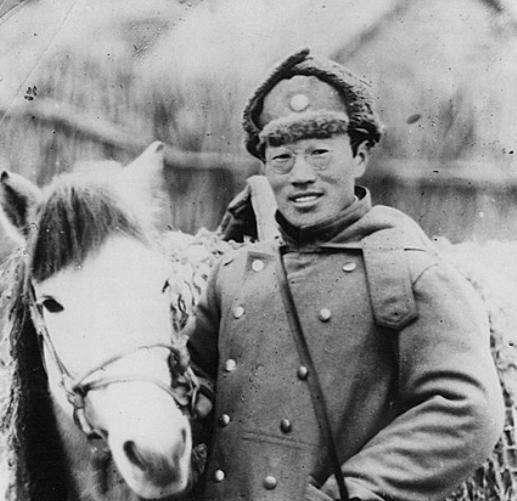More than half a century ago, the war launched by the Japanese army to invade the land of China was undoubtedly the darkest period in Chinese history. But in that stormy day, China also emerged a lot of heroes, the country is in trouble, they used blood and tears to compose an immortal war song.
The one we want to talk about today is the founding general, who has experienced hundreds of battles on the anti-Japanese battlefield, his name is Wan Yi, and he is a very cheerful and optimistic general.

In 1907, General Wan Yi was born in Dalian, Liaoning Province, to an ordinary peasant family, and at the age of 8, he moved with his parents to Jinzhou County, where he was sent to private school for several years. In 1925, Wan Yi was admitted to the Fourth Infantry Section of the Northeast Army Army Military Teaching Corps with excellent results, and a year later he served as a second lieutenant aide-de-camp in Zhang Xueliang's adjutant office.
The turning point in General Wan Yi's journey came from the Xi'an Incident, after which he completely lost confidence in the old Chiang Kai-shek, and after the outbreak of the War of Resistance Against Japan, he resolutely chose to join the revolutionary cause and wanted to truly make a contribution to his country.
General Wan Yi is a person who has experienced the baptism of war, and the people who really come out of the war, generally speaking, people who are usually bold, are always afraid when they really go to the battlefield of life and death, but General Wan Yi is different, he is very good at war, and he is very excited when he hears about the war.
For example, in 1943, Wan Yi served as the deputy commander of the Coastal Sub-district of the Shandong Military Region of the Eighth Route Army. In November, he was leading his troops on a sweeping mission when the reconnaissance platoon leader came to report on the situation: "A Japanese force has arrived at the White Reed River and is preparing to cross the river. "
Wan Yi, who had rich combat experience, immediately decided to ambush the Japanese army and wanted to annihilate them in one fell swoop. However, by the time Wan Yi arrived at the ambush site, he found that the time was too late, and the Japanese army began to cross the river. At this time, the general's war quality was reflected, and he very decisively changed the ambush operation to sniper warfare.
But there's a troublesome place here, and that's the reed grass by the river that's long and dense, blocking the sniper's view. In a hurry, Wan Yi decided to stand up on his own, observe the enemy's movements with the telescope, and then tell the machine gunner. Although this can solve the situation of insufficient vision of the machine gunner, it makes Wan Yi a living target on the opposite side.
At this moment, a bullet passed through Wan Yi's ear, and then a second and a third arrived. The soldiers told Wan Yi to hurry down, but Wan Yi still insisted on observing the enemy's movements. Saying that it was late and fast, only to see a bullet directly hit Wan Yi's face, not only passing through his right face, but also breaking 7 teeth, Wan Yi was suddenly unconscious and fell straight down.
When the comrades-in-arms saw that Wan Yi was so badly wounded, they rushed him to the rear hospital. Just at this time, the international friend Austrian doctor Roshengt was in the rear hospital, and when he heard about this matter, he rushed over to personally preside over the operation. With his efforts, the operation was very successful, and Wan Yi was out of danger.
Two months later, Wan Yi was allowed to be discharged from the hospital, and when he returned home, he immediately rushed to the mirror and took off the gauze on his face. Looking at himself in the mirror, he laughed and said, "The Japanese army has returned this bullet to me for beauty." It turned out that the bullet was in a fortuitous position, leaving a dimple on Wan Yi's face. Everyone was touched by Wan Yi's optimistic spirit and laughed at the side.
After the end of the War of Resistance Against Japan, Wan Yi not only served as a leading member of the Jiliao Provincial Committee, but was awarded the title of founding lieutenant general in 1949.